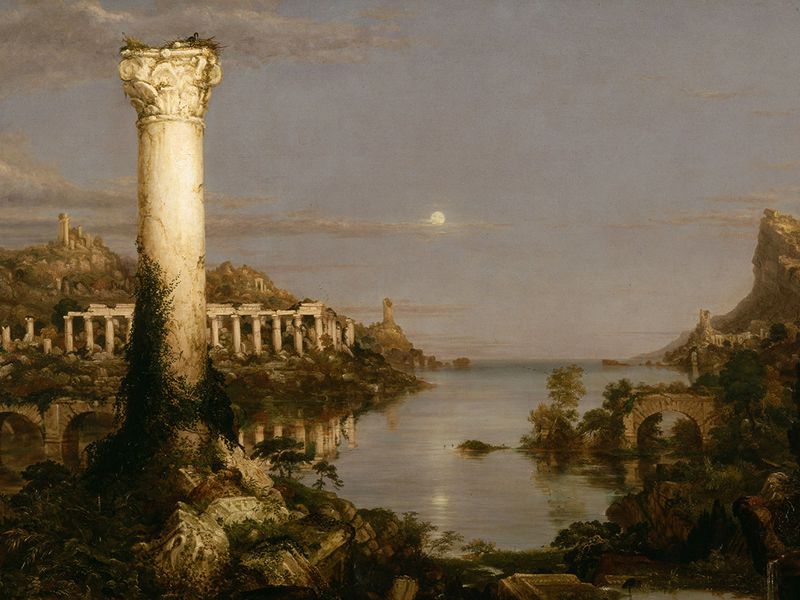by Andrew Rattray
It’s hard to pin the ultimate ending of the Roman Empire to a single cause. Of course there is no single date we can point to but rather a gradual collapse over hundreds of years. In the 3rd century the Empire was split into East and West, and by the 6th century the Western portion of the Empire was reduced to a collection of ‘barbarian’ rump states leaving the Eastern Empire to endure alone, eventually coming to be known as the Byzantine Empire, though it’s inhabitants no doubt continued to consider themselves Romans for some time. The rising influence and power of Germanic tribes such as the Visigoths and Ostrogoths, the slave shortage that came after the expansion of the empire slowed in the second century CE (thus damaging the Roman economy), the excess and opulence of the Emperors and the corruption such behaviour encouraged at the highest levels of government, and many more factors all played their part in the decline of the Western Empire, but what of the East?
Well, there are two factors that had an enormous impact upon the Eastern Empire that are often overlooked and which I believe we should be paying much closer attention to, after all, as George Santayana wrote, ‘Those who cannot remember the past are condemned to repeat it.’
You see, the Roman Empire rose to prominence during a period of warm, wet, temperate weather in Europe which was vital for the necessary agrarian production which allowed the empire to grow to encompass an immense, urbanized population, but so too did the climate play a factor in Rome’s ending. Investigations into the Earth’s ice sheets, known as ice-core research where scientists drill deep into the Earth’s ice caps to investigate climate in ages past, have revealed a large amount of volcanic activity in the 530s and 540s CE. This activity is thought to have triggered what is known as the ‘Late Antique Little Ice Age’ which brought cold temperatures that endured for well over one hundred years. The particulates fired into the atmosphere by these eruptions caused more reflection of the sun’s light and ultimately cooled the climate across the world. This in turn led to years of poor harvests which catalysed a famine across the Eastern Empire just at the time Rome’s enemies were growing bolder.
Ultimately this sudden shift in climate may not impact us in the same way it did the Eastern Empire in the 6th and 7th centuries, and indeed under the guidance of Emperor Justinian I the Eastern Roman Empire, now Byzantine Empire in the historical record, did have success in reconquering some of the lost lands of the Western Empire, for a while. We have more secure food chains, more robust technology, but will that be enough to weather the changes that we face? Will we be able to overcome the challenges on our own horizon?
Another factor in the decline and ultimate fall of the Empire is the rising influence of pestilence and plague that coincided with the Late Antique Little Ice Age. The highly industrialised and urbanized society of the Empire allowed it to develop a powerful economy needed to fuel its war machine and diplomatic influence, however the high density also created perfect conditions for bacteria and disease to develop and spread. The interconnectedness of the empire too was both a boon and a curse as while it cultivated trade and mobility it also allowed infection to spread more quickly between cities and regions than they may have otherwise.
In fact, the Empire was rocked by outbreaks of brutal disease and infection in the centuries immediately after the onset of the climatic changes brought on by the Late Antique Little Ice Age in the form of the Antonine Plague, the Plague of Cyprian, and finally an outbreak of Bubonic Plague under the emperor Justinian. While it recovered between each successive outbreak the body-blows took their toll and in the aftermath of each epidemic the Empire found itself a little more wounded, a little more beaten down, than it had been before.
As Heraclitus of Ephesus was known for espousing, the only constant in life is change. The world today is vastly different to the 6th century, but we must not be complacent or over-enamoured with our own ideas of power in the face of Western hegemony. We are on the cusp of a new age of change, spurred by climate change and humanity’s growing technological developments. Can we learn from our past to take steps to ensure the security and prosperity of not just Western nations, but humanity all across the globe? Can we adapt to the new normal and still maintain the geopolitical status quo? Consider the balance of power of our modern world, how long do you think it will last? Forever?











3 comments
It must be academically fashionable to blame every fall of an empire on a problem such that the Homo sapiens could have no solution. Bad weather and adverse geologic events are ever with us. Still, I posit that Bureaucratic Incompetencies was the culprit – lacking the ability to lead, all they had, and have, is a gun, so what else may one expect? Acting Machiavellian was alive and well and practiced long before the Italian thug wrote his masterpiece.
The civilization and culture was crushed by Islamic jihad. Period.
Forget “Climate Change”, which always happens, I think Gibbons has been right since his time: cultural upheaval inevitably destroyed Rome and that was the introduction & spread of monotheism in Europe, in the name of Christianity. Byzantium had a constant struggle with a new monotheism, Islam, which it ultimately lost to, several centuries after Islam erased the nations & states it came across.
Our apologies, you must be logged in to post a comment.